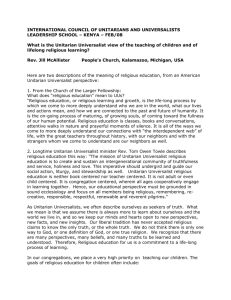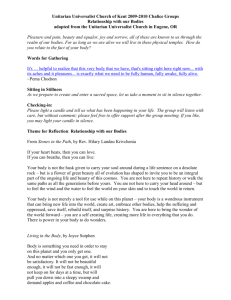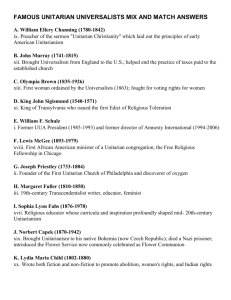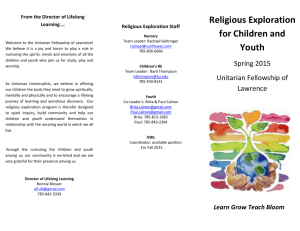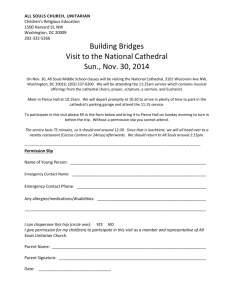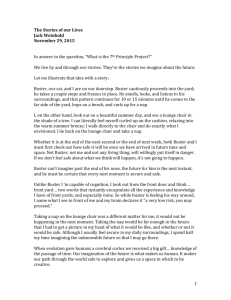Agenda Booklet
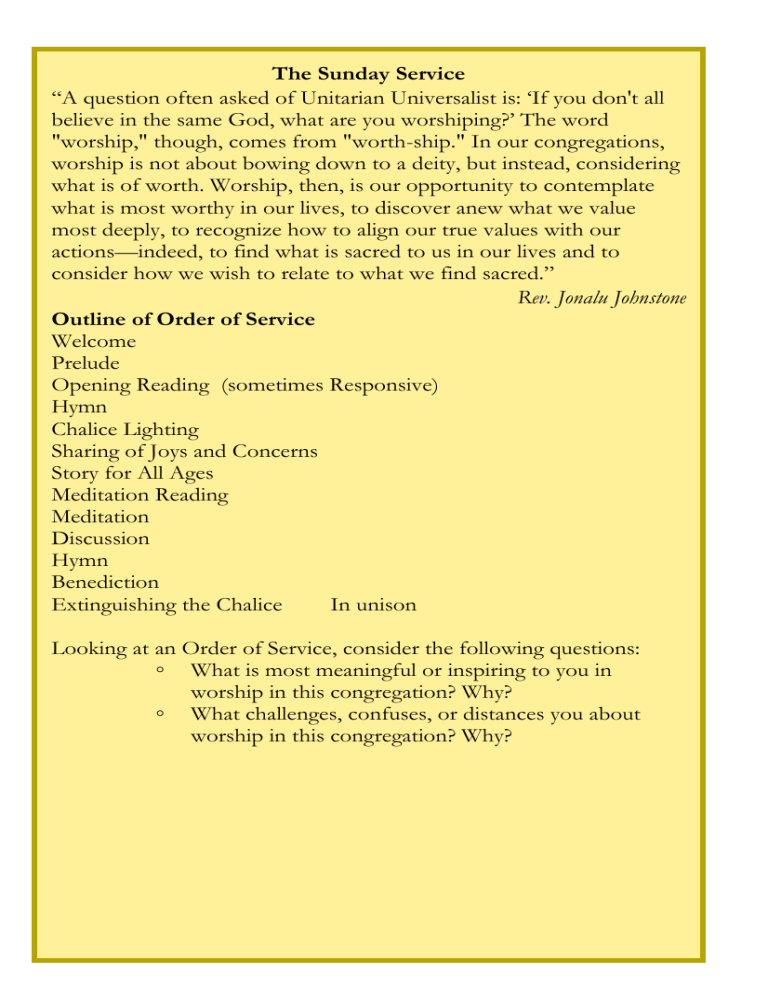
The Sunday Service
“A question often asked of Unitarian Universalist is: ‘If you don't all believe in the same God, what are you worshiping?’ The word
"worship," though, comes from "worth-ship." In our congregations, worship is not about bowing down to a deity, but instead, considering what is of worth. Worship, then, is our opportunity to contemplate what is most worthy in our lives, to discover anew what we value most deeply, to recognize how to align our true values with our actions—indeed, to find what is sacred to us in our lives and to consider how we wish to relate to what we find sacred.”
Rev. Jonalu Johnstone
Outline of Order of Service
Welcome
Prelude
Opening Reading (sometimes Responsive)
Hymn
Chalice Lighting
Sharing of Joys and Concerns
Story for All Ages
Meditation Reading
Meditation
Discussion
Hymn
Benediction
Extinguishing the Chalice In unison
Looking at an Order of Service, consider the following questions:
◦ What is most meaningful or inspiring to you in worship in this congregation? Why?
◦ What challenges, confuses, or distances you about worship in this congregation? Why?
Wiesbaden Unitarian Universalists
5 January 2014
Love is the doctrine of this church, the quest of truth its sacrament, service its prayer.
Discussion Group
Introduction to Unitarian Universalism
Lighting the Chalice & Opening Reading
#441 Singing the Living Tradition Jacob Trapp
Our Own Beliefs: Sentence Starters
Story : Cathedral of the World Rev. Forrest Church
Questions We Hope Our Discussion Might Address…
Looking at Some of the Big Questions
A Brief Look at the Order of Service and the Hymnal
Closing Singing the Living Tradition # 705 Hosea Ballou
~~~~~~~~~~~
Calendar
12 January UU Fellowship of Frankfurt 1
Sunday Service 15:00, John & Elizabeth’s apartment
19 January
Sunday Service 14:00 Hainerberg Chapel
26 January Kaiserslautern UU Fellowship
Sunday Service 13:30 Kapaun Chapel
The Seven Principles
• The inherent worth and dignity of every person
• Justice, equity and compassion in human relations
• Acceptance of one another and encouragement to spiritual growth in our congregations
• A free and responsible search for truth and meaning
• The right of conscience and the use of the democratic process within our congregations and in society at large
• The goal of world community with peace, liberty, and justice for all
• Respect for the interdependent web of all existence of which we are a part
Unitarian Universalist Sources
Unitarian Universalism draws from many sources:
• Direct experience of that transcending mystery and wonder, affirmed in all cultures, which moves us to a renewal of the spirit and an openness to the forces which create and uphold life
• Words and deeds of prophetic women and men which challenge us to confront powers and structures of evil with justice, compassion, and the transforming power of love
• Wisdom from the world's religions which inspires us in our ethical and spiritual life
• Jewish and Christian teachings which call us to respond to
God's love by loving our neighbors as ourselves
• Humanist teachings which counsel us to heed the guidance of reason and the results of science, and warn us against idolatries of the mind and spirit
• Spiritual teachings of earth-centered traditions, which celebrate the sacred circle of life and instruct us to live in harmony with the rhythms of nature.
Articulating Our Own Theology: Sentence Starters
We're going to introduce ourselves by sharing something about our own experiences or beliefs. As the basket comes to you, tell us your name. In the basket are sentence starters. Draw out a sentence and complete it aloud. There are no right or wrong answers, only your answer. If you pick one that you can't or don't want to answer, feel free to try a different one. Forgiveness requires...
Prayer offers...
Love means...
A spiritual practice for me is...
I feel wonder and awe when...
A person who inspires me...
Peace comes when ...
A source of comfort for me...
Inspiration comes from...
Good and evil...
Sometimes I doubt...
Spirituality is... .
When I'm down, I... .
The most important thing in life...
I deeply value...
Worship gives me...
My concept of evil... .
In my experience, church...
Salvation means...
My source of spiritual sustenance...
Religion requires...
Religion offers...
Unitarian Universalist theology has both individual and group components.
Personal experience is the beginning of Unitarian Universalist theology.
Each of us develops our own beliefs. At the same time, we support and challenge one another in those beliefs through our sharing together about what we believe. This is not an easy task, but we have just been doing theology, in a distinctively Unitarian Universalist manner. As UUs, we expect people to bring their own experiences and understandings of religious questions rather than to subscribe to a particular set of beliefs or a particular theological viewpoint. However, we also expect that in the course of sharing with one another, our theologies will be shaped and deepened, or even changed.
AFTERLIFE
While there are a variety of views of the afterlife, most Unitarian
Universalists consider this life the important one. Some believe in an ultimate unification with God, or the universe. Many Unitarian Universalists believe that the only afterlife is the legacy people leave on earth. Consistent with the idea of universal salvation, hell is rarely discussed except as a metaphor, as in "hell on earth."
SIN
Unitarian Universalists shy away from talk of sin, but some agree with the
Jewish tradition that defines it as "missing the mark"—falling short of our values. That is, we acknowledge that people have shortcomings and make mistakes but have an optimistic view of human nature. Good and evil are usually considered human constructs that result from human actions.
EVOLUTION
Evolution, as a scientific proposition, is widely accepted. Unitarian
Universalists rely on scientific process as one of the ways to truth.
SPIRITUAL PRACTICES
Spiritual practices vary widely among Unitarian Universalists. Some practice meditation, either from a tradition such as Buddhism or in a more generic fashion. Prayer is a spiritual practice for some Unitarian Universalists, while some avoid it. Other spiritual practices include music, yoga, Tai Chi, social action, or activities like gardening, walking, or playing with children.
SALVATION
Salvation receives little attention, but when it does, it is often construed as wholeness and health in this life, rather than a state attained after death.
REVELATION
Some traditions are persuaded that God's revelation was given at a particular time and place. In contrast, Unitarian Universalists perceive that truth comes not only from many places, but that we are continually discovering truth. The truth I learn tomorrow may contradict or enhance what I have learned today. The traditional way of saying this is, "Revelation is not sealed."
STORY: CATHEDRAL OF THE WORLD
Imagine awaking one morning from a deep and dreamless sleep to find yourself in the nave of a vast cathedral. Like a child newborn, untutored save to moisture, nurture, rhythm, and the profound comforts at the heart of darkness, you open your eyes upon a world unseen, indeed unimaginable, before. It is a world of light and dancing shadow, stone and glass, life and death. This second birth, at once miraculous and natural, is in some ways not unlike the first. A new awakening, it consecrates your life with sacraments of pain you do not understand and promised joy you will never fully call your own.
Such awakenings may happen only once in a lifetime, or many times. But when they do, what you took for granted before is presented as a gift: difficult, yet precious and good. Not that you know what to do with your gift, or even what it really means, only how much it matters. Awakening to the call stirring deep within you, the call of life itself—the call of God—you begin your pilgrimage.
Before you do, look about you; contemplate the mystery and contemplate with awe. This cathedral is as ancient as humankind, its cornerstone the first altar, marked with the tincture of blood and stained with tears. Search for a lifetime (which is all you are surely given) and you shall not know its limits, visit all its transepts, worship at its myriad shrines, nor span its celestial ceiling with your gaze. The builders have worked from time immemorial, destroying and creating, confounding and perfecting, tearing down and raising up arches in this cathedral, buttresses and chapels, organs and theaters, chancels and transepts, gargoyles, idols, and icons. Not a moment passes without work being begun that shall not be finished in the lifetime of the architects who planned it, the patrons who paid for it, the builders who construct it, or the expectant worshippers. Throughout human history, one generation after another has labored lovingly, sometimes fearfully, crafting memorials and consecrating shrines. Untold numbers of these collect dust in long-undisturbed chambers; others (cast centuries or eons ago from their once-respected places) lie shattered in chards or ground into powder on the cathedral floor.
Not a moment passes without the dreams of long-dead dreamers
being outstripped, shattered, or abandoned, giving way to new visions, each immortal in reach, ephemeral in grasp.
Welcome to the Cathedral of the World.
Above all else, contemplate the windows. In the Cathedral of the World there are windows without number, some long forgotten, covered with many patinas of grime, others revered by millions, the most sacred of shrines. Each in its own way is beautiful. Some are abstract, others representational; some dark and meditative, others bright and dazzling. Each window tells a story about the creation of the world, the meaning of history, the purpose of life, the nature of humankind, the mystery of death. The windows of the cathedral are where the light shines through.
Because the cathedral is so vast, our time so short, and our vision so dim, over the course of our pilgrimage we are able to contemplate only a tiny part of the cathedral, explore a few apses, reflect upon the play of darkness and light through a few of its windows. Yet, by pondering and acting on our ruminations, we discover insights that will invest our days with meaning.
A twenty-first-century theology based on the concept of one light and many windows offers its adherents both breadth and focus. Honoring multiple religious approaches, it only excludes the truth claims of absolutists. That is because fundamentalists claim that the light shines through their window only...
Skeptics draw the opposite conclusion. Seeing the bewildering variety of windows and observing the folly of the worshippers, they conclude there is no light. But the windows are not the light. They are where the light shines through.
We shall never see the light directly, only as refracted through the windows of the cathedral. Prompting humility, life's mystery lies hidden. The light is veiled. Yet, being halfway in size between the creation itself and our body's smallest constituent part, that we can encompass with our minds the universe that encompasses us is a cause for great wonder. Awakened by the light, we stand in the cathedral, trembling with awe.
Excerpted from Cathedral of the World , by Forrest Church. Copyright 2009 by Forrest Church.
Reprinted by permission of Beacon Press, Boston.
COMMON VIEWS AMONG UNITARIAN UNIVERSALISTS
BIBLE
Both Unitarianism and Universalism grew out of Christianity. Early
Unitarians and Universalists took the Bible seriously, though rarely literally.
While we continue to see it as a rich resource of stories and wisdom, most
Unitarian Universalists do not see the Bible as authoritative on its own.
CLERGY
The role of clergy and the extent of their authority was an active question of the Reformation. From our radically Protestant heritage, we believe each person must formulate their own beliefs rather than subscribe to what is passed down. Clergy offer their views, which may hold some authority based on their education and experience. However, they hold no more authority for most Unitarian Universalists than other respected members of the community.
GOD
UUs have widely divergent concepts of God. Some espouse belief in God and others do not. Few Unitarian Universalists believe in an anthropomorphic God, tending instead toward concepts such as Nature,
Love, or Spirit of Life. Some UUs do not find the term God useful. Rarely do Unitarian Universalists ascribe gender to God, but when they do, they may deliberately use a variety of gender formulations: for example, Mother-
Father God.
DIRECTION FROM GOD
Unitarian Universalists do not categorically deny the experience of receiving guidance from a divine or holy source as an individual understands it. Our first Source references "direct experience of that transcending mystery and wonder" which could be called God or could be Nature, Ultimate Reality, or other concepts that are meaningful to UUs. UUs do believe that all knowledge, from whatever source, requires testing, and that testing is best done in community.
JESUS
Jesus is generally considered a prophet and teacher rather than God, or the only son of God. Christian Unitarian Universalists endorse the religion taught by Jesus, rather than the religion about Jesus.
